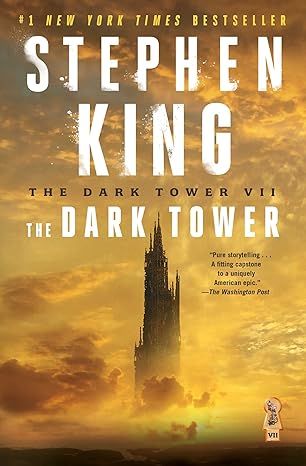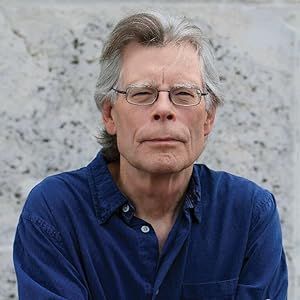The Dark Tower VII: The Dark Tower (7)
4.7 out of 5
12,576 global ratings
Creating "true narrative magic" (The Washington Post) at every revelatory turn, Stephen King surpasses all expectation in the stunning final volume of his seven-part epic masterwork. Entwining stories and worlds from a vast and complex canvas, here is the conclusion readers have long awaited—breathtakingly imaginative, boldly visionary, and wholly entertaining.
Roland Deschain and his ka-tet have journeyed together and apart, scattered far and wide across multilayered worlds of wheres and whens. The destinies of Roland, Susannah, Jake, Father Callahan, Oy, and Eddie are bound in the Dark Tower itself, which now pulls them ever closer to their own endings and beginnings...and into a maelstrom of emotion, violence, and discovery.
864 pages,
Kindle
Audiobook
Hardcover
Paperback
Audio CD
First published October 31, 2005
ISBN 9780743254564
About the authors
Stephen King
Stephen King is the author of more than fifty books, all of them worldwide bestsellers. His first crime thriller featuring Bill Hodges, MR MERCEDES, won the Edgar Award for best novel and was shortlisted for the CWA Gold Dagger Award. Both MR MERCEDES and END OF WATCH received the Goodreads Choice Award for the Best Mystery and Thriller of 2014 and 2016 respectively.
King co-wrote the bestselling novel Sleeping Beauties with his son Owen King, and many of King's books have been turned into celebrated films and television series including The Shawshank Redemption, Gerald's Game and It.
King was the recipient of America's prestigious 2014 National Medal of Arts and the 2003 National Book Foundation Medal for distinguished contribution to American Letters. In 2007 he also won the Grand Master Award from the Mystery Writers of America. He lives with his wife Tabitha King in Maine.
Read more
Reviews

General Zombie
5
Great ending to a fine series
Reviewed in the United States on November 13, 2004
Verified Purchase
Once again I seem to be in the minority, as I, as of this moment, consider The Dark Tower to be the best of the series, and probably the only one I'd give 5 stars.(all the rest would likely get 4) Hell, I tend to think the oft-maligned final three books in the series are superior to the first 4, so ya know that I'm not on the same page as most readers.(Though this is doubtless related to the fact that I first started reading this series just under 3 weeks ago rather than 20 years and haven't been forced to wait and wait) Furthermore, I even like the ending, more or less. I'm not gonna say that it's utterly satisfying, but it makes a good, if not terribly profound point. It's quite a sad ending really, but appropriate and with an obvious glimmer of hope. And, frankly, I find it hard to imagine that there could've been a completely satisfying ending, anyway. I find the people complaining about the ending amusing: most of them have obviously missed the point entirely. To suggest that the ending is 'not an ending' is ludicrous, and those who say that King's aside urging us to not to read the final few pages is him admitting that the ending is bad are, flatly, idiots.(POTENTIAL MAJOR SPOILER: I can't imagine anything someone could say that would be more of an admission that they don't get the point than that) Not that this makes much of a difference; those who hate the ending w/o understanding it would almost certainly hate it as much, if not more, if they did. Sadly, my conscience refuses to allow me to go into specifics, as it is impossible to do so w/o explicitly giving away what happens at the very end. If anyone out there really cares what I think(unlikely) or is angry or thinks I'm covering my lack of understanding by being vague(more likely) feel free to email me.
The ending aside, I just found this to be the most enjoyable novel of the series. Many people hate King's bringing himself into the series, and the referential nature of the latter novels, but I think's it's fun and, cleverly done too. It's hard for me to get too specific really, it's just fast-paced and highly readable, and the characters are as interesting and likable as ever. And though he doesn't do all that much, I find Mordred to be quite an interesting and disturbing character. (Certainly fairly pitiable as well) Many people have complained about the use seeming deus ex machina to help the ka-tet through there struggles, but I don't mind. The fact is, by this point it has been well established that ka(fate, more or less) controls the universe(s), and thus it would be almost inappropriate for fortune not to shine on them. Certainly, you are allowed not to like this notion, but it is a part of the series, so ought to expect it by now. And frankly, this just isn't as big as a part of this novel as people would have you believe. There's perhaps only one significant deus ex machina in the novel, but it's used to reinforce the theme of arts relationship to life and vice versa.( MAJOR SPOILER ALERT: Furthermore it's quite apparent that Patrick's arrival intended almost exclusively for thematic purposes: It's quite clear that the Crimson King, while powerful, is still essentially human, and King coulda just had Roland blow his head off. Of course, than people would complain that it was too easy-- ya can't please everyone. Nevertheless, this is a deus ex machine of theme, not plot) Beyond all this, I think this is the evocative and chilling of the series. I particularly like the arrival at the Crimson King's abandoned castle, Flagg/Walter's confrontation with Mordred and their nightmare flight from the enormous, tentacled and many-eyed beast. It's just a pleasure to read, as simple as that.
On a final, not very important note, the illustrations in this novel tend to be a bit of a mixed bag, as is true of the series in general. However, I think the picture of the Crimson King atop his throne of skulls is absolutely great. Even if you aren't interested in the book you should open it up and take a look at it.(it's on page 622, I believe.)
But really, reviewing this book is essentially pointless, from a practical standpoint. If you've read the first 6 you're almost certainly going to want to read this one, and if you don't you must be sufficiently disillusioned with the series that little anyway could say would change your mind. But I like it a lot.
Read more
4 people found this helpful
Solipso
5
Epic fantasy, blending horror, the supernatural, and adventure.
Reviewed in the United States on June 30, 2011
Verified Purchase
I have just completed Stephen King's series The Dark Tower. This is not a review for volume seven, THE DARK TOWER, alone. It is for all seven volumes of The Dark Tower series, which should be read as one story.
The Dark Tower, SK's magnum opus, is based on two fictional concepts: 1) Robert Browning's long poem "Childe Roland to the Dark Tower Came" (provided in full in the Appendix of the seventh volume, THE DARK TOWER) and 2) Sergio Leone's series of movies starring Clint Eastwood as a gunslinging drifter.
Is The Dark Tower worth reading? If you appreciate epic fantasy, yes. If you can tolerate occasional gaffs in writing style and convention, yes. If you despise horror, the supernatural, adventure, and action, and if you think such literature must be trashy pulp, no.
THE GUNSLINGER introduces you to Browning and Leone's dual concept and to Jake. THE DRAWING OF THE THREE sets the mode: that of contemporary fantasy with portals to parallel worlds. And it introduces Roland's partners. THE WASTE LANDS is a good adventure in a parallel world. WIZARD AND GLASS for the most part digresses into Roland's past, but it is a superb story of romantic adventure. WOLVES OF CALLA stops along the way to the Dark Tower as Roland and his partners rescue villagers and display their gunslinging. SONG OF SUSANNAH is a story of unusual pregnancy, blending action and horror in a setting of modern America. THE DARK TOWER brings the long quest to a conclusion, with tragedy but also with ample good cheer. (Do read THE DARK TOWER'S Coda.)
Though SK is one of contemporary humanity's more prolific, famous, and wealthy writers, do not confuse ability to sell with ability to write. I quail from the idea of every aspiring author trying to emulate him. For example he has a certain habit with concrete imagery. Stylists encourage concrete imagery, but SK gets carried away, at times making his prose feel phony and cheap. Mostly apparent in his descriptions of sex and violence, this habit pops up in other regards, as when he describes disease and excretion. In Writing Tools, Roy Peter Clark says, "Know when to back off and when to show off." With universally familiar phenomena like sex and excretion, we do not need detailed concrete images. Those are times to back off.
Also, SK likes to show off his skill with offbeat jargon in dialog and character viewpoints. But this makes too many of his characters appear alike, and unconvincing.
And SK can be a bit verbose. Especially in the later volumes of this series, he seems to follow Strunk & White's admonition "Delete unnecessary words" less than he follows the apocrypha "The thicker the book, the more impressive it is."
Though I consider SK an occasional, worthy digression, I prefer standard prose, polished by authors (and editors) who pay close attention to Strunk & White's The Elements of Style. I award The Dark Tower five stars because I do not consider flawless prose a requirement and because The Dark Tower is a good story.
Be it ever so, and I thankya.
Read more
3 people found this helpful
Anonymous
5
One of the best books I have ever read!!!
Reviewed in the United States on January 11, 2013
Verified Purchase
There is so much to say and yet, I am at a loss for words. Finishing this book, this series was amazing and saddening at the same time. I would say that this epic was life changing, but that is to strong of a statement, however, any other statement would not do this series justice. I couldn't stop thinking about these books, every time I set it down in the back of my mind was the constant thought of the tower. Will Roland finally make it to his life's goal and journey to the top of the tower? Will his Ka-tet continue to support his journey or will madness over take them all? This series was by far the best epic story line I have ever read, and that is saying something. I have read epics like Lord of the Rings, and Harry Potter, but this in my opinion is better on so many levels.
This book is the final chapter in the Tower series and one of the best books I have ever read. It is a very close second to my all time favorite book but almost ties for the #1 spot. Now it could partially be the fact that I have read six other books just to get to this point and it is my favorite because it is the end. In truth it is due to the fact that it is the longest book I have ever read at 1050 pages, and I flew through this as if it was a short novel. When I would read I wouldn't be able to put it down unless I fell asleep from exhaustion or work required me to. It was amazingly well written and suspenseful and engaging from the very beginning. There were parts that I wished were a bit longer but when I went back and realized it took several long chapters and a large page count I realized I fell into the story and got lost in the action.
There is so much I want to say about this but it will give away to much of what is in other books and I hate spoilers in reviews. All I can really do now is send out my heartfelt desire for everyone to read this whether they like it or not. It seems like it should be something everyone should read at some point in their lives much like most of the other epic stories out there. Love it or hate it, I loved it, and hope that if this review gets one more person to Journey with Roland and his Ka-tet to the Dark Tower I will have fulfilled a need to pass on the wonder of these books.
Read more
3 people found this helpful
Hill Young J. Lam
5
Older King's writing is inflated and undisciplined with frequent unnecessary author intrusions
Reviewed in the United States on November 4, 2016
Verified Purchase
EDIT: I forgive everything. The ending was so spectacular, so real, so poignant to me I am reeling from it. I forgive all the irritations I've mentioned - this series is the best reading experience I've ever undertaken in my life.
I'm a die-hard Stephen King fan. I'm the Constant Reader, the kind that would read the King's laundry list. I read all of his books many times, usually within days of release, except the Dark Tower. I thought it would be a Western-gun-type story and wasn't interested, but I finally got into it a month ago and I marveled at how I could possibly miss it - it truly is his greatest work, with a kind on-the-edge thrilling pace and steaming plot you seldom see in his horror novels. I read all seven books continuously over the past few weeks, couldn't put it down, and getting more and more disappointed. You can see how young King and old King's writing differs so greatly in both plot and language. Young King is tightly disciplined, highly structured, no unnecessary and distracting insertions that's really about the writer's ego than of service to the story. By this final book, I caught myself rolling my eyes frequently at unnecessary author intrusions to the story and plot, which is getting weirder and weirder all the time, like a bad psychedelic trip. Even the way the characters speak to each other doesn't flow with the natural ease and seamless belief in his old books, with frequent author intrusions about what Eddie or Roland or whoever is like, e.g. "...we might as well look at him a bit more closely. We won't take long, for Pimli Prentiss isn't central to our tale of Roland..." - IS THIS NECESSARY? My good man, just tell the tale and leave the narrator out of it. Let your characters speak for themselves. By the end of Song of Susannah I could barely follow the narrative with real immersion (I skipped the entire series of journal logs by King at the end of the last book. What was that about? Totally unnecessary)
That said, it's still one awesome ride. I know how much work it is to write a good book. So despite all this, the merits outweighs the faults, and it's all worth it.
Read more
15 people found this helpful
Robert Strecker
5
THIS IS AS EPIC AND CLASSIC AS THE DRAWING OF THE THREE AND WIZARD AND GLASS GREAT JOB BY KING
Reviewed in the United States on September 10, 2016
Verified Purchase
This was a great end with a return to the wandering gunslinger theme. There have been negative reviews in relation to the last 3 books of the series and this is annoying though understandable. Stephen King is unfortunately in the classification of pop writer. his title means he i very popular so there will always be a percentage ofpeople who do not like change and risk such as what he did with the last few books. Wolves of the calla was slow moving with a fast climax that left people confused. I loved this one and immediately understood that it was writtenwithin the context of respect to the classic western novel. Meaning heros ride into town, get to know the townspeople, agree to help them defend themselves against an outnumbered force. Th pace was deliberately structured like that. Songs of Susannah was hands down an experimental novel and why not, it was the 6th book. This was one of my favorite in theseries and understandablyone of the least popular. I loved it and was amazed at the risk King took in making something so imagiative it was hands down the most creative of the series. The last book The Dark Tower ties with Wizard and Glass as my second favorite with The Drawing Of THe Three being my favorite. I am unfortunately a big fan of Kings coked out period which produced his other masterpices such as Misery and It. While one can accurately say that an artist had peaks and dips which is true of King I have yet to find a book of his i did not like (well actually there is one dr sleep) but other than that ilove his ability to tell a story. This finall book, not to give away any details was a fitting although tragic ending. What do you expect? Rolands story was always consistently tragic so it makes sense for the totality of the story to be dramatic and tragic. Our beloved katet became true gunslingers and therefore intentially began a very risky lifestyle. Inconclusion come along and read the final chapters of this epic tale. A lot of things happen in this volume and its in the tradition of the first book.
Read more
William J. Meegan
5
MAGNIFICENT CONCEPT: The symbolic trials and tribulations of an author's quest to write and complete his creation: his book.
Reviewed in the United States on August 6, 2008
Verified Purchase
Stephen King the author of the Dark Tower series is of course the Gunslinger: from the first volume to the seventh. In one of the most amazing symbolic epics ever written Stephen King has documented the loneliness and creative efforts of an author in his quest (the trials and tribulations) to create and finish a new novel.
The Man in Black is none other then his yet undefined creative genius who sets out the plot at the end of the first volume via the Tarot Cards by prophecizing the drawing of the three. To chase the Man in Black across the desert (mind) is essential to the beginning of any creative effort. This is why the Man in Black dies at the end of the first volume because his roll is complete in defining the limits and boundries of the new creative work.
Modred or should it be read 'MORE DREAD' as in the author's fear of not completing his task, which is a demon child always lurking in the background of any author's mind.
Ed Dean is the addict turned gunslinger, which is Roland or should it be read 'Roll On' or 'dragon = drag on' that can not stop creating until completion come, which is addiction in exclusion to the existence of all other aspects of creation: family, friends and society at large. This is the reason that Roland twirls his fingers as if to say 'get on with it' or 'roll on'. Keep the narrative going to get the work finished.
Susannah is symbolically the psyche of King, which has a one track mind: hence the wheel chair. This is why Ed Dean and Susannah fell in love with each other: two sides of the same coin (addiction and obsession).
Jake represents symbolically the 'youthful spirit' of the new creative idea of the new volume to be written whether it be King's first creative effort CARRIE or the last book he ever writes. Remember that it was Jake that was first pulled into Roland's world.
Oy seems to represent 'literary licence', which is the perogative of every author.
The Crimson King is 'Stephen King' incarnate locked out of what goes on in the tower because the book being written, regardless of its title, is the DARK TOWER, which takes on a life of its own. The book therefore writes itself and the author is helpless to do other then to fling spite and hate (slings and arrows) at the genius, which Roland represents but to no avail. The author forever dreams of writing his book (ruling the universe) unfettered by those seemingly unnecessary appendages: Ed, Susannah, Jake and Oy but the laws of creative writing locked Stephen King out on the balcony of his own genius preventing him from inserting his input. The book has taken on a life of its own and the author is powerless to prevent its journey to completion and he can only look on as his work completes itself.
As Roland: Stephen King, is snatched once again into that final room at the top of the DARK TOWER as if he is in an eternal time-loop he dreads the future of yet reliving the creative juices that flows through a writer as he journeys to the end of yet another book. Stephen King has written more then forty books and each time he had to relive this time-loop: the birth and completion of yet another book. He can not stop or retire from writing, for his mind will not allow it, for it is after all who he is: the last gunslinger.
Read more
4 people found this helpful
Amazon Customer
5
Some Possible Spoilers?
Reviewed in the United States on February 8, 2011
Verified Purchase
Whew! Where do I begin if ka is a wheel? OK, I read "The Drawing of the Three" when I was still a kid (not nineteen if you need to know) because my parents owned a copy. But that was all they owned and while I liked it, books in a series were always difficult to obtain in order and "Drawing" was actually the second book. I gave up on it at that time. When I heard that movies were being discussed, I checked out pricing on the books and discovered to my great delight that all 7 books were available on my KINDLE! Yippee! I read all seven in approximately 5 days (no, I'm not exaggerating nor am I boasting. It's important to my review as you'll see in a moment).
I'm the kind of reader that King doesn't want me to be: I rush pell-mell, frantic, devouring the story to hasten my arrival at the end. I never ever simply skip to the end (that would be cheating and pointless) but I do absorb a book at lightning speed to reach the end. I've always been a fast and obsessive reader but this series took me from the first line. I have never wanted more to get to the end. DOES ROLAND ENTER THE TOWER? WHO IS IN THE TOP ROOM? WHY SO MUCH DAMNED PALAVER? I WANT THE TOWER!!!!!
Allow me to digress for a moment. As I said, I never ever skip to the end and read the last few pages but I have NEVER been as tempted in my life to find these Amazon reviews which promised spoilers and read them (good or bad) to find out if he gets to go inside the darned TOWER! I resisted the temptation but only just barely.
I am giving the SERIES 5 stars. Some of the books I didn't like so much, others I loved ("The Gunslinger" being my favorite). Some parts dragged, others didn't. I agree wholeheartedly with the complaints against the series (especially this last book) but I still think it is worth the full five stars. Why would I do that? Here's why, commala:
- Stephen King is a master of characterization. He sets the biggest literary trap I have ever encountered and it is called the Dark Tower series. First you encounter a man who may or may not be a good guy at all (see what he does to Ally, to the children and women of Tull, to Jake who even then he nearly loves). You WANT to hate (or at the very least dislike) him. You WANT to resist the pull of his damned dark tower because you recognize it for the single-minded, destructive obsession that it is. BUT YOU CAN'T! That's even before you get to the second book.
Then we meet Eddie and despite holding a knife to Roland's body and truly hating Roland for all that's happened, Eddie CAN'T resist his magnetism. Despite Detta's black (pardon the pun) hatred for Roland, even DETTA CAN'T resist Roland or his tower. The characters give you, dear constant reader, more reasons to go with him. When Eddie, Susannah, and Jake become taken with the quest as well, you are now TRAPPED. Despite your own wishes, King has carefully crafted his characters so that you can no longer choose to leave them and by extension, you cannot leave Roland because they WON'T leave him.
YOU ARE NOW TRAPPED.
-
The writing and the complex nature of the journey with surprises around every corner, mystery about doorways and new elements of Roland's world continue to keep you enthralled. Adding new characters even in the very last stage of the game KEEPS YOU TRAPPED. Despite how long you know them for (Patrick for example), you still must love them because it is ka's (Stephen's) will.
-
And now for the ENDING: (because I, like Roland, must also learn the lesson of the Tower): There are 2 endings.
In the first ending (that ending contained in Browning's poem), Roland calls the names of those he has sacrificed to attain the Tower and a horn blows. Susannah enters the unfound door to discover she is in a world in which Eddie and Jake are brothers and they both love her. She is whole again with those who have passed on (there are other worlds than these) while Roland is whole having completed his quest and entered the Tower. THE END!
But there is a CODA. And while it is the last word that Stephen King has to tell us about ROLAND's quest, it is NOT "THE END." It is not a neatly completed finale to an epic and captivating quest. It is pain and suffering magnified and bent back upon itself in a possibly endless loop.
I'm not going to discuss the possibility that other reviewers have mentioned that this time it will be different because he now carries the Horn of Eld. It is an entertaining theory but it is still nothing more than a theory. There is evidence within the text to suggest that he will NEVER learn his lesson and there is also evidence within the text to suggest that the Horn will make all the difference and this next time around will be his last. I will not argue it and feel it really to be a moot point.
It is a MOOT POINT because the trap is not only laid for ROLAND. Remember, we are trapped with Roland. Other reviewers have mentioned King's preface to the coda, telling Mr. King he need not apologize to those too stupid and disloyal to be offended at what follows. Yet it is THE MOST IMPORTANT AND MOST CLEARLY STATED meaning of the entire series!
Stephen King was speaking directly to me (and those like me who rush madly through the story just to arrive at a satisfactory ending). He told me that I was wrong. He told me that if I went any farther I would regret it. Because the first ending was neat. I was content to know that Roland got his desire: he found the tower and the door was NOT shut against him. The door welcomed him. Everything was neat and tidy. I don't need to know who/what is in the top of the tower, that's entirely for Roland to discover. And I am content to know that he will discover it. ONLY THERE'S THIS BLOODY CODA which I just have to read because it is there, placed AFTER the ending. And I just have to rush through the author's warning because there is MORE to know.
And boy, I regretted it. I did regret it! I've reconciled it now but whether I will live to regret it remains to be seen.
Now come to me, commala, come, and I'll tell you the secret of the Dark Tower:
You are Roland. You have journeyed and you have loved the cold, mad Roland of the first books, you have rebelled against the warming of his heart when he learned again to love, you have sacrificed peace in your "real" life to rush through Roland's story. You have sacrificed each of your real obligations so that in your (5-day for me) reading session you could arrive at a neat and tidy ending. In the course of it, Stephen has pushed the limits of your credulity with far too much deus ex machina, he even put himself into the story and you took all this (despite how much you rebelled) because the Dark Tower (the "end") was always your obsession.
You have heard much palaver, many stories, many tales of love and life and death and much journeying. And still you did not linger. You refused to SMELL THE ROSES. You chose to press on, heedless of the beauty and love around you, press on doggedly without mindfulness toward your tower, toward your ending.
As a last resort, you are even then told EXPRESSLY BY THE AUTHOR that YOU SHOULD TURN BACK NOW. LEAVE IT ALONE. DO NOT PRESS ON TO YOUR OWN VERSION OF THE TOWER. WALK AWAY.
BUT YOU DON'T. Because you are Roland and you must see the room at the top of the tower.
And now you are turned out of the Tower and set back on your life and told to remember the lesson: the journey is the most important. We cannot know whether or not Roland will get it right this time. It is not our right to know. We lost that right the moment we followed Roland to the top of the tower.
You now have a choice. Will you change your own ways, constant reader, or will you be doomed as Roland?
***Time will tell for me. Long days and pleasant nights.
Read more
13 people found this helpful
raesdays
4
the dark tower, finally
Reviewed in the United States on November 17, 2012
Verified Purchase
Just like a good horror movie blends a terrifying ghost with the every day creaks and groans of an old house, the Dark Tower series blends fiction and reality. Ka is a wheel and it echoes, and when I read The Dark Tower I saw those echoes everywhere. And when I was reading late at night I could just see the real-life King waking up in the middle of the night with a strange nursery rhyme in his and head and wonder where it came from. (And for the record, I liked that King put himself in the book, and this is one reason why.)
And I loved that this series was completely ludicrous. Have you ever tried to tell someone the plot? You sound insane.
"Well there's this talking dog thing that really love this kid, and this kid died before but then came back and went into a new world through an old demon house in Brooklyn. At one point, they ride a suicidal train that likes to tell jokes. And another time these characters actually meet the author that wrote them. Also doors open from nothing into alternate universes and they swing by the Emerald City on their way across Kansas. And there's a pretty important weapon named after the snitch in Harry Potter."
And that's, like, minor plot points.
But I had so much fun when I read it. And I think King had fun with it, too. And I love Oy, Jake, Eddie, Susannah, and, yes, even Roland. Although it took me a while to love Roland. He is cold and unforgiving and focused and heartless. Or is he? He grows to love, and he begins to realize that some people and some loves are worth his life. He even tries to sacrifice himself for Jake. But ultimately, he chooses the Tower. He always chooses the Tower.
Books 1 through 4 are the best, and if you are one of those people on comment threads I have been reading who say they don't get book 4 and it's a waste of time and a weird flashback, I do not and probably will never understand you as a person. Wizard and Glass is a beautiful story and is beautifully written and gives life and love to Roland. And even if you never read another book in the series, Wizard and Glass could stand on its own and break my heart every time (in a good way). I loved the first three books as well. They are so fun and each is so different from the other and they were exciting to read. Lobstrocities! Billybumblers! Doors that went from a beach to the inside of a drug addict's head on an airplane ride to drug deal in Miami! Each new book was like a whole new story, a new style, and an entire new experience. And that was wonderfully exciting to read.
[SPOILERS BEGIN HERE]
I think Roland's downfall is that he chooses the Tower over everything. How many loved ones and strangers has he killed or let die to get closer to it? He knows their names, he knows his price, but he never stopped. Even when he and Jake both knew that one of them would die as they continued on their quest, they both continued. But Roland did it for the Tower, and Jake kept going because of his love for Roland. It's this difference that Roland doesn't learn until it is too late.
Roland saves not just one world but all of the worlds, and even that is just a byproduct of getting him closer to the Tower. Just like leaving the horn on Jericho Hill. Because at that moment, after Cuthbert died, Roland couldn't even take 15 seconds to stop and pick up the item that came from his ancestors and meant something to him, and to his now dead friend. Because it would have taken too long, and he had to get on his way.
[EVEN MORE SERIOUS SPOILERS. IF YOU READ AHEAD, HERE IS ANOTHER CHANCE TO STOP.]
And on his way to what? In this book, death. We lost Eddie first. I cried, obviously. The love and respect between the ka-tet was uplifting to be a part of. And when it broke, it was devastating. But we saw it coming, didn't we? Ka is a wheel, and Eddie was so like Cuthbert. At the battle where we lost Eddie, we gained the beams, and theoretically the well-being of the universe. As Roland's ka mates freed the Breakers from their work of destroying the beams that hold the universe together, we met a few more characters from King's other books. I love these details, it makes me feel like King and his books are operating in a different place altogether (and all together). Like it's their world and we're just living in it.
And to see Sheemie again. His devotion to Roland was so sweet, and I'm so glad he got to find some peace after their previous meeting in Mejis, where so much went wrong. From the prison where Eddie (and Sheemie) died, we went with the ka-tet back to Americaside to save the selfish, lazy Stephen King.
Again, I liked that Stephen King was in these books. It's fun you guys! Don't you know fun? Not everything has so be so serious traditional literature, and I think once we passed a robot bear semi god, a woman who has split personalities but was only pregnant in one of them, and a demon spider baby, we have gone way past reality and way past the traditional rules.
Also, I like Stephen King. He seems like a fun guy and he has some crazy things in his head. I'd like to grab dinner with him, maybe sit and chat over a strong tea.
I also liked the parts where Roland went to the Tet Corporation and met those who did so much to help his cause. Though now that I think about it now, that does seem like a side road we might not have needed to go down. (I bet Pere Callahan thought that about a few of his roads, too.) But it was a nice conclusion to the Tet Corp., and if nothing else, this was a story of conclusions.
Walter's life concluded in a most ugly fashion. And to all you haters, I agree that it was anticlimactic. But I think that makes it perfect. For a supervilliansemiimmortal to get trapped and killed without anyone-even him at first-knowing? I don't think Walter deserves to go out with a bang.
Oy's life ended here, too. After Mordred finished off Walter he headed unknowingly into Oy's path, who died to protect Roland from his werespider son. My heart hurt for Oy, who I love so much for his love of his ka mates. He and Jake were so perfect together and Oy showed his love and his courage over and over. Oy reminds me of my pet cat, which is partly why I love him so much. His chatty, loyal personality could be my cat to a T. He even battles the occasional spider he finds in my apartment.
And you know we have to talk about it. The Ending, with a capital E
[THIS IS YOUR LAST CHANCE. DO NOT KEEP READING UNLESS YOU HAVE READ THE ENTIRE SERIES, I BEG OF YOU]
It's horrible. I was sick to my stomach. We just went through all of that fun, all of that pain, all of that story just to do it all over again? It's horrifying, but it's perfect. How many times did he tell us Ka is a wheel? How many times did he tell us it all comes back around? And until Roland learns that love and people should be his motivations and not the Tower itself, he will continue on his heartbreaking quest eternally.
Or maybe not. He learned enough this time around (the 19th time around?) to remember to stop and pick up the horn and Jericho Hill on his next journey. He learned this time to love and to be willing to sacrifice himself for this love, but I believe he learned it too late. And did he really learn? He learned to love, but when the world was saved, and the beams held up, he didn't go with Susannah, his ka mate. He went on, alone, to the Tower.
Read more
5 people found this helpful
Nessa
4
The End
Reviewed in the United States on September 19, 2024
Verified Purchase
All bittersweet to be sure. There are so many tears and so much heartbreak in this story. I had a hard time making it through because it made me so sad. The ending makes sense to me because of how Roland is. It was quite a journey, and I am glad I got to experience it.
Chris Gladis
2
It breaks my heart....
Reviewed in the United States on January 1, 2011
Verified Purchase
Well, here we are. After a long road - longer for some of us than for others - we have finally reached the end of The Dark Tower series. For some of us, it's been twenty years in coming, so if you've only started reading this series recently, count yourself lucky. You don't know how we waited for this book, the book wherein Roland would finally attain his goal, and we would see if all the sacrifices he made were worth it.
Were they? Kind of.
I'll get into more detail later, after I dutifully put up the "Here Be Spoilers" sign, but this is the book where everything gets resolved, and our heroes are given their reward for the hard work they have done. The bad guy is beaten, the world is saved, and all is well. Although "well" is a very relative term in this sense, and while the bad guy is beaten, it's not very satisfying, and the reward that many of our heroes get isn't necessarily the reward they would have chosen.
If I sound like I'm dancing around the story, that's because I am. I have an aversion to spoiling books in these reviews, mainly because I know how satisfying it is to get into a good book and discover things. To see old characters appear from the past, and to witness the heroism of the characters we have come to love. To look at the journey they take and see their relentless pursuit rewarded. At the same time, I don't want your experience poisoned by knowing the drawbacks to a book - the soft spots in the plot, the characterization problems, the disappointments and the heartbreaks. [1]
This book contains all of these, and if I avoid talking about them, then this review will be awfully short. So, Constant Reader, I tell you this: you can stop here. You can click away to another page, perhaps to Amazon to buy the book and read it yourself (I recommend the Kindle edition if you can - I have the hardcover and it is quite the doorstop), perhaps to put off the reading of the book for a while longer. You don't have to learn things that will taint the journey of discovery that is reading , and you can live on with a vision in your head of how The Dark Tower series should end, instead of how it actually does.
Would you stay, then? Very well. After this point, there is no turning back. What is learned, as they say, cannot be unlearned.
This is not the book I wanted. It is unbalanced, hard to get through, and disappointing in many ways. There are also some beautiful moments, and some interesting ideas which, upon post-reading reflection, make the whole story more meaningful. But my overall feeling was one of great disappointment. Let's start from afar, shall we?
The structure of this book is rather lopsided. The most climactic event in the book, the battle of Algul Siento, is quite exciting and fun in that it is what we readers expect from a climax - gunfire and death and the saving of worlds. By freeing the Breakers from their work on the Beams, Roland and his ka-tet do indeed save the macroverse from complete dissolution. They have literally saved the world and, as we learn later, have completely thwarted the evil designs of the Crimson King. The story could end there, the characters could go on their separate ways, and all would be well.
The problem is that this occurs in the first half of the book. It's followed soon after by a minor climax - Roland and Jake saving Stephen King from certain death by drunk driver - but even that is done a little more than halfway through the book. Stephen King is safe, the New York Rose is safe, and we find out later that not only are the last two Beams intact, they are regenerating and will probably regenerate the other four. Reality has been saved.
But the story goes on, because saving reality was never Roland's goal. It was only, in the parlance of Dungeons and Dragons, a side quest. There's a larger quest to be resolved.
This wouldn't be so bad if there were an even bigger climax waiting for us at the end, but there isn't, and this is where I feel kind of betrayed. When Roland gets to the Dark Tower, we know he will have to face the Crimson King, who has been held up as the incarnation of death, evil and chaos. He has been the main antagonist throughout this whole series. His reach is long, his power vast, and his hate for Roland of Gilead is as focused as a laser and as hot as the sun. He is as close to the Devil as we can get.
So, when Roland finally makes it to Can'-Ka no Rey, the great field of roses within which the Dark Tower stands, who do we see? A "satanic Santa Claus" who throws explosives from the only balcony of the Tower he's been able to reach. He's generically ugly, screams like a madman, and talks in villain cliches - "GUNSLINGER! NOW YOU DIE!" or "YOU DON'T DARE MOCK ME! YOU DON'T DARE! EEEEEEEE!" or "EEEEEEEE! EEEEEE! STOP! IT BURNS!" On top of all that, the Crimson King is finally defeated not by Roland's guns or some great battle on the physical, intellectual or spiritual plains, but by a guy with a sketchpad. He is simply erased from afar. And thus ends the reign of what was supposed to be the greatest horror of all worlds.
What's more, their meeting at the Tower was not acually the defeat of the Crimson King - he conceded defeat way back during Wolves of the Calla. We find out that, with the defeat of the Wolves, the King foresaw the end of the Breakers and thus his plan to unmake creation. So, he broke his Wizard's Glasses, killed nearly everyone in his castle. killed himself by - for reasons I still don't understand - swallowing a sharpened spoon, and then, undead (which I also don't understand), rode off for the Tower.
Even then, though, he couldn't win. In order to enter the Tower he needed either Roland's guns or Mordred's birthmark, neither of which he had. So he climbed up into one of the Tower balconies with all the weapons he could carry and just waited. If Roland hadn't come to the Tower, he would have waited there forever and never harmed anyone again. By bringing his guns, Roland raises the possibility that the Crimson King could still triumph. So, by continuing his quest, Roland endangers all existence.
As much as I hate to call out authors on what they "should have" done, I feel like I have to here. A hero is only as good as his villain, and the Crimson King, in the end, turns out to be a pretty crappy one. I wish King had made their meeting worthy of the image he had built up. The same goes for one of our favorite characters, Randall Flagg (or whatever name he chooses to use). He has floated through this series and others like a cancer, bringing nothing but death and pain with him. He's a charismatic madman who revels in chaos and is probably one of the most enjoyable characters King has created. So how does he die? He gets killed by Mordred, the bastard son of Roland and the Crimson King, of Susannah and Mia. He gets killed and eaten without much of a fight. I think a lot of fans would agree that Flagg deserved better.
And while we're on the topic - Mordred.
One of my measurements of good characterization is a question: If this character did not exist, could the story have ended the way it did? With Jake and Father Callahan, Susannah and Eddie, with Oy and Flagg and Cuthbert and Susan and Cort, the answer is, of course, No. Each of those characters contributed something vital to the story, something that no other character could have done. To reach the same end without one of those characters would have meant a vastly different story.
The same cannot be said of Mordred. Of the people he kills, only two matter to us: Flagg and Oy. Flagg should have been the penultimate End Boss, the final challenge for Roland before reaching the Tower and the Crimson King. And there are many ways to kill a Billy-Bumbler - I think King could have thought of one that gave Oy the same honorable and heartbreaking death that he got trying to save Roland from Mordred. Other than that, Mordred had no impact on the story at all. He just followed Roland, Susannah and Oy, shivering and whining and feeling sorry for himself. He kept telling us that he was meant for great things, but never showed even the slightest hint of that potential. He follows Roland like Gollum follows Frodo, but at least Gollum turned out to be important.
The one thing we do get from Mordred is a frustrating bit of knowledge - that the Crimson King and Roland are both descended from the mythical king Arthur Eld. In that way, their battle is between cousins, and Mordred represents a unification of two bloodlines - demon and human. If their conflict had been framed in that context, it could have been so much more interesting when we finally got to the end.
Speaking of the end. We, like Roland, didn't know what to expect when we finally got into the Dark Tower. And I don't think anyone expected that the series would loop around to the beginning again, dumping Roland back in the Mohaine Desert to follow the Man in Black once more, unaware that he had already done so so many times before. It was an unsatisfying ending at first, but upon reflection, it does work, and there are two ways to look at it.
The first is that Roland is being taught a lesson, one which he still has not learned. He's being taught to value life, to reset his priorities. From his youth, he was so focused on the Tower that he let all else fall aside - his friends, the girl he loved, and the sacred artifacts of his forefathers. He brought death with him, and passed it on to all whom he loved, and ended his quest as alone as he began it. And so, despite saving the multiverse, Roland failed his true quest - to learn how to love others and share who he was with them - and had to be sent back to start again. In appreciation of his effort, however, he was granted a change: the horn of Eld, which he had previously neglected on the field of the last battle of civilization. Perhaps it will make a difference.
The other way to look at this ending is a more metafictional one, something that Stephen King himself finds distasteful. Like it or not, though, one of the overriding themes of this series is the impact that fiction has on reality, and vice versa. To readers, a character might be more real than real people. We learn lessons from them, we have kind or unkind memories of them, and in many ways, our fictional characters possess a special reality. To a writer, this is even more true. Ask any writer and they will tell you about how their characters talk to them, sometimes appear in front of them, or even take over their bodies for a little while. A writer will discover things about a character that she never planned, as if the character himself were revealing them. The Dark Tower relies on this kind of ur-reality of fiction, up to and including fictional characters saving the life of their own writer.
So, by connecting the end of the last book with the beginning of the first, perhaps King is implicating us, the Constant Readers, in Roland's suffering. Roland cannot rest as long as there are readers reading him, and we are all guilty of making him go through it again and again. While King may have created Roland and his quest, we propagate it, and every new reader ensures that it will never, ever end. [2]
In the end, we have a series that started off strong, and then kind of careened to an unsatisfying end. Having been written intermittently over the course of thirty years, I suppose that shouldn't be too surprising. Ideas which seemed like good ones at the time served only to cause trouble later down the road, and loose ends that needed to be tied up took up far more time than they should have. Perhaps with a clearer vision of the journey at the beginning, King could have held it together better. And perhaps without his brush with death in 1999, he wouldn't have felt compelled to get the last three volumes out as soon as he could.
It does, however, gift us with some wonderful characters, a rich and brilliant world, and a fictional cosmology that holds together all the worlds that King has created thus far. It's an examination of the importance of fiction in our lives, and the way that stories can reach out and touch so many more people than the storyteller ever intends. If you are a fan of Stephen King, and you haven't read this series yet, then you should. For all that the last couple of books disappoint, there is still much good to be found in the whole series, and the first five are generally really well done.
There is more to read, if you're interested. King's assistant, Robin Furth, has put together an excellent Concordance, detailing pretty much everything you want to know about the series - characters, places, history, language and concepts. She has also written a series of graphic novels for Marvel Comics which detail Roland's youth, starting with the events told in Wizard and Glass and going up to the terrible battle of Jericho Hill. So if the original series leaves you wanting more, there's certainly more to be had.
That's it, then. Long days and pleasant nights to you all.
"Even when you were in the shadow of death there were lessons to be learned."
- Jake (narration), The Dark Tower
[1] To be fair - this book was published back in 2004. If you haven't read it by now, I doubt you're really going to be chuffed by some spoilers, and you have no one to blame but yourself if you haven't gotten around to reading it yet.
[2] A third option is suggested by his short story, "That Feeling, You Can Only Say What It Is In French" from Everything's Eventual, wherein a woman riding with her husband in a car on vacation keeps re-living a terrible accident. It is implied that she is dead, and that hell is the eternal repetition of one's mistakes. It is possible that Roland is dead, and that this series is his Hell.
Read more
12 people found this helpful
Top Stephen King titles
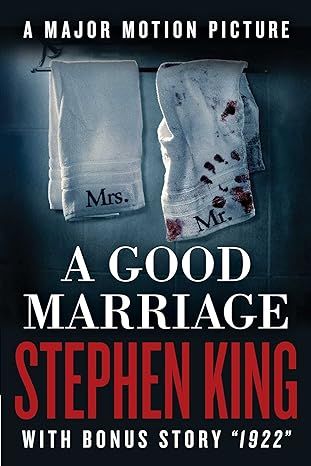
A Good Marriage
4.1
-
5,995
$4.99
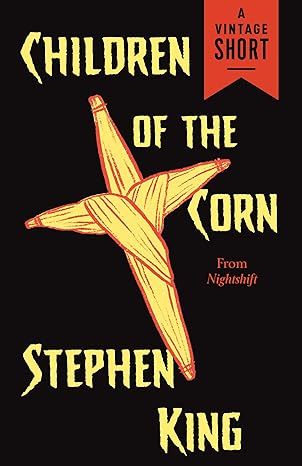
Children of the Corn (Kindle Single) (A Vintage Short)
4.3
-
1,084
$0.99
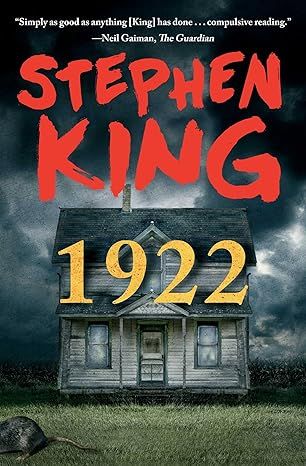
1922
4.6
-
6,082
$7.99
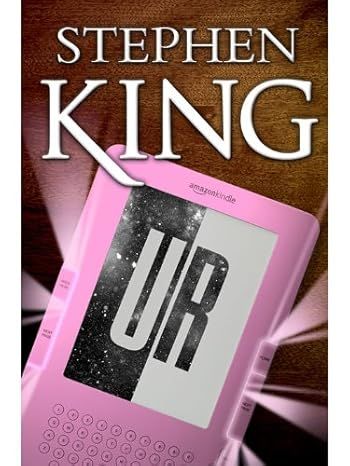
UR
4.3
-
6,140
$3.99
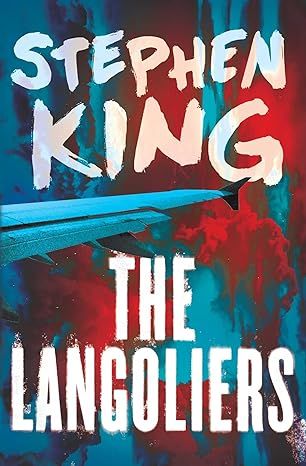
The Langoliers
4.6
-
1,014
$6.49
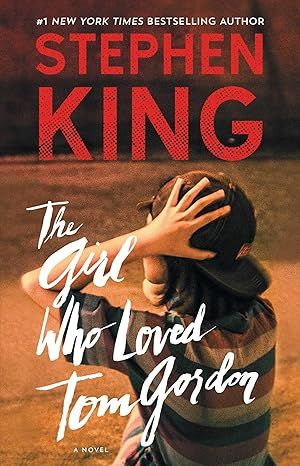
The Girl Who Loved Tom Gordon: A Novel
4.5
-
4,774
$1.17
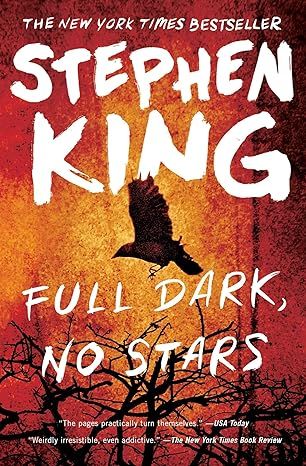
Full Dark, No Stars
4.6
-
6,762
$5.00
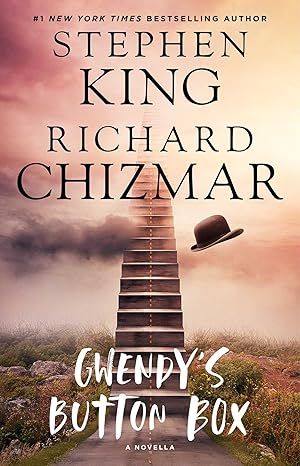
Gwendy's Button Box: A Novella (Gwendy's Button Box Trilogy Book 1)
4.5
-
21,335
$3.88
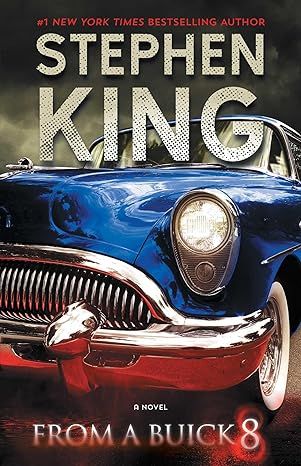
From a Buick 8: A Novel
4.3
-
2,174
$11.99
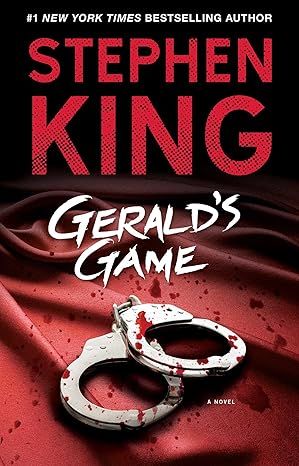
Gerald's Game
4.2
-
3,838
$1.97
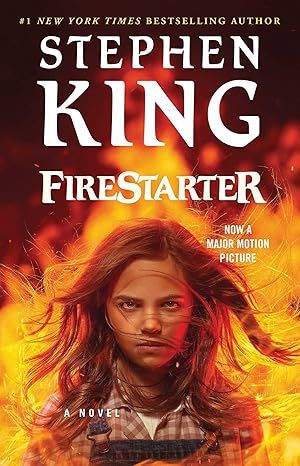
Firestarter
4.6
-
5,489
$9.99
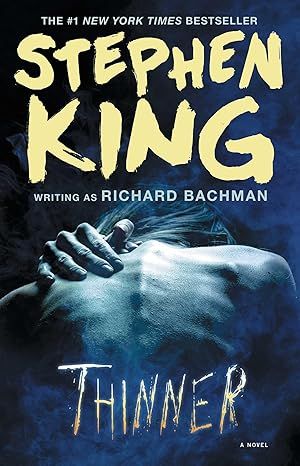
Thinner
4.5
-
3,107
$2.50
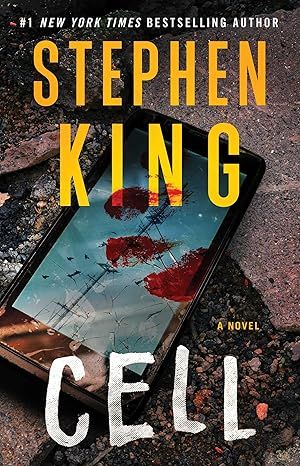
Cell: A Novel
4.3
-
5,196
$3.31
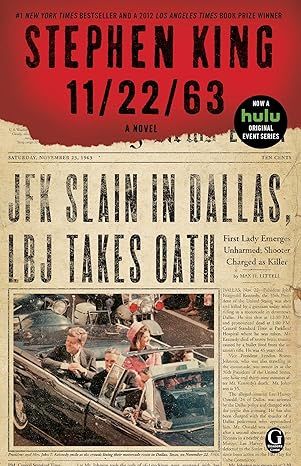
11/22/63: A Novel
4.6
-
11,307
$11.99
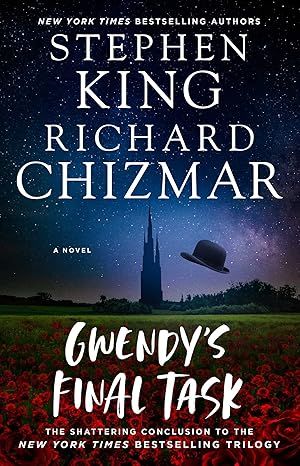
Gwendy's Final Task (3) (Gwendy's Button Box Trilogy)
4.6
-
8,788
$7.87
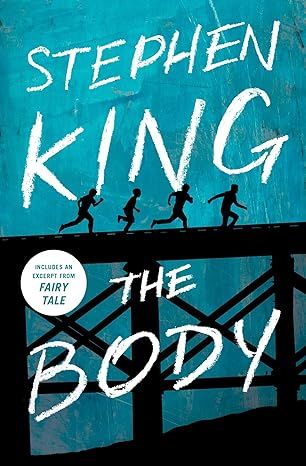
The Body
4.7
-
4,496
$10.48
Best Sellers

The Tuscan Child
4.2
-
100,022
$8.39

The Thursday Murder Club: A Novel (A Thursday Murder Club Mystery)
4.3
-
155,575
$6.33

Sapiens: A Brief History of Humankind
4.6
-
140,302
$13.49

The Butterfly Garden (The Collector, 1)
4.3
-
88,556
$9.59

Things We Hide from the Light (Knockemout Series, 2)
4.4
-
94,890
$11.66

The Last Thing He Told Me: A Novel
4.3
-
154,085
$2.99

The Perfect Marriage: A Completely Gripping Psychological Suspense
4.3
-
143,196
$9.47

The Coworker
4.1
-
80,003
$13.48

First Lie Wins: A Novel (Random House Large Print)
4.3
-
54,062
$14.99

Mile High (Windy City Series Book 1)
4.4
-
59,745
$16.19

Layla
4.2
-
107,613
$8.99

The Locked Door
4.4
-
94,673
$8.53
